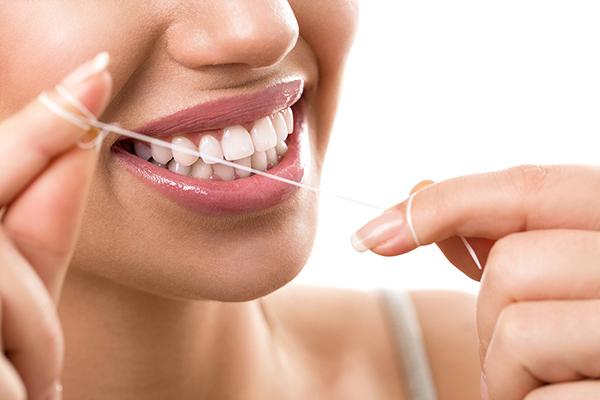Most dental patients come into the office twice a year for a teeth cleaning. However, some patients are told that they need to get a deep cleaning instead, and that they need to see us more often than twice a year. Read more
What Is a Deep Cleaning?


Most dental patients come into the office twice a year for a teeth cleaning. However, some patients are told that they need to get a deep cleaning instead, and that they need to see us more often than twice a year. Read more

Any dentist will tell you that dental care is important, but what we might not explain is exactly WHY dental care is important. Though you see a different doctor for your physical health than you do for your oral health, much of what your dentist does is connected to your overall health. Read more

A periodontist is a fully trained dentist who specializes in treating periodontal disease (advanced gum disease) and the placement of dental implants. Read more

 There is more than one type of dental procedure that may be casually referred to as a cleaning. For example, there is a regular cleaning & then there is what is referred to a deep cleaning. It’s important to understand that there is a big difference between these procedures & implications that each of these procedures have when it comes to your oral health.
There is more than one type of dental procedure that may be casually referred to as a cleaning. For example, there is a regular cleaning & then there is what is referred to a deep cleaning. It’s important to understand that there is a big difference between these procedures & implications that each of these procedures have when it comes to your oral health.
A regular cleaning, which is called prophylaxis by dental professionals, is what most people think of when they think of going to the dentist for a checkup. Prophylaxis involves removing plaque, calculus & stains from teeth. (Plaque is a sticky substance that builds up on teeth as a byproduct of bacteria feasting on the food you eat. Calculus, also known as tartar, occurs when plaque & minerals in your mouth harden.) A dental hygienist or a dentist uses a specialized cleaning device, called an ultrasonic scaler, to remove plaque & calculus. This cleaning occurs only on the visible part of the tooth, known as a the crown.
Regular cleaning is only recommended for patients who have generally good oral health & do not suffer from bone loss or gum problems (bleeding, recession, infection, etc.)
Root planing is a procedure that involves removing tartar, bacteria, toxic deposits from the root of a tooth, all the way down to where gum & bone meet. While it is sometimes casually referred to as a “deep cleaning”, you should know that this treatment is quite different from prophylaxis. This procedure is required as a treatment for periodontal disease or periodontitis (commonly called gum disease, though it also affects the bone).
Many people can have periodontal disease & not even know it. Symptoms of the disease include bleeding gums, bad breath, teeth that look longer due to recessed gums, & swollen or red gums. However, many people do not notice any symptoms at all. That’s why it may come as a surprise when your dentist recommends scaling & root planing instead of a regular cleaning. It’s important to understand that this procedure is vital to getting periodontal disease under control & avoid future tooth loss, though other procedures including surgery may be required to treat the disease.
Once you have been diagnosed with periodontal disease & have undergone scaling & root planing, periodontal maintenance is what you can think of as taking the place of prophylaxis in your dental care routine. Rather than just addressing the just crowns of your teeth as in prophylaxis, periodontal maintenance also cares for your tooth roots, gums & bone. In other words, think of it as cleaning & maintenance for the tissues affected by your periodontal disease. The frequency of your periodontal maintenance appointments depends on your individual oral health condition & will be determined by your dentist.
 As dental professionals we often feel like a broken record (or a scratched CD, depending on your generation) telling patients that they need to floss more. We don’t mean to be nags, we just want you to have the healthiest, happiest smile possible!
As dental professionals we often feel like a broken record (or a scratched CD, depending on your generation) telling patients that they need to floss more. We don’t mean to be nags, we just want you to have the healthiest, happiest smile possible!
While brushing cleans the front & back surfaces of your teeth, flossing is the only way to properly clean the spaces between your teeth (what dental pros call the inter-proximal region). Even if you’re a teeth brushing superstar, you’re not cleaning your entire tooth if you don’t floss.
Here are just a few of the problems you will avoid by flossing daily:
The same micro-organism filled plaque that accumulates on the front & back of your teeth can accumulate between them. This bacteria-ridden buildup can cause cavities & tooth decay if it isn’t cleaned away by flossing.
The bacteria in plaque left between your teeth can also eventually lead to bad breath. So if you brush & use mouthwash & still find yourself with bad breath, not flossing may be the culprit.
Plaque that is left on your teeth can eventually harden into a substance called tartar, which can lead to gum disease. You can prevent the development of tartar by flossing, but once tartar has formed, only scaling & cleaning at the dentist can remove it.
Poor dental hygiene has been linked to both heart disease & aggravation of symptoms for those with diabetes. Remember that your mouth is an entry point for your entire body, so keeping your teeth healthy by brushing & flossing can prevent disease-causing pathogens from getting in.
If you feel you need a reminder of the best way to floss, your dentist or dental hygienist will always be happy to give you a demonstration at your next visit. You may also be more likely to floss if you find the right type of floss for your mouth. Try different types, such as unwaxed, waxed or tape floss, or floss on a pick tool, until you find what feels the most comfortable for you.
 Our team has been caring for our community for a while now & we’ve noticed many patients come to us with the same questions over & over again. Always feel free to ask us questions when you have them! In the meantime, check out the FAQ & answers below to learn more about your oral health. Read more
Our team has been caring for our community for a while now & we’ve noticed many patients come to us with the same questions over & over again. Always feel free to ask us questions when you have them! In the meantime, check out the FAQ & answers below to learn more about your oral health. Read more
[vc_row row_height_percent=”0″ back_color=”color-174584″ overlay_alpha=”50″ gutter_size=”3″ column_width_percent=”100″ shift_y=”0″ z_index=”0″][vc_column][vc_column_text]North Canton: 330-497-7302
[city-2]: [phone-2]
[city-3]: [phone-3]
[city-4]: [phone-4]
[city-5]: [phone-5][/vc_column_text][/vc_column][/vc_row]
[vc_row][vc_column column_width_percent=”100″ position_vertical=”middle” gutter_size=”3″ overlay_alpha=”50″ shift_x=”0″ shift_y=”0″ shift_y_down=”0″ z_index=”0″ medium_width=”0″ mobile_width=”0″ width=”1/1″][vc_column_text]
We are located a half mile north of the intersection of Everhard Road & Main Street.. Please use the map below to find directions to our office. If you have any questions, please call us at [phone-link].[/vc_column_text][vc_raw_html]JTNDZm9ybSUyMGNsYXNzJTNEJTIyZm9ybS1pbmxpbmUlMjIlMjBhY3Rpb24lM0QlMjJodHRwcyUzQSUyRiUyRm1hcHMuZ29vZ2xlLmNvbSUyRm1hcHMlMjIlMjBtZXRob2QlM0QlMjJnZXQlMjIlMjB0YXJnZXQlM0QlMjJfYmxhbmslMjIlM0VFbnRlciUyMHlvdXIlMjBzdGFydGluZyUyMGFkZHJlc3MlM0ElMjZuYnNwJTNCJTI2bmJzcCUzQiUwQSUzQ2lucHV0JTIwbmFtZSUzRCUyMnNhZGRyJTIyJTIwdHlwZSUzRCUyMnRleHQlMjIlMjAlMkYlM0UlMEElM0NpbnB1dCUyMG5hbWUlM0QlMjJkYWRkciUyMiUyMHR5cGUlM0QlMjJoaWRkZW4lMjIlMjB2YWx1ZSUzRCUyMlBhbG1lciUyMFJhbmNoJTIwRGVudGFsJTJDJTIwJTIwODgwMCUyMFMlMjBUYW1pYW1pJTIwVHJhaWwlMkMlMjBTdWl0ZSUyMEMlMkMlMjBTYXJhc290YSUyQyUyMEZMJTIwMzQyMzglMkMlMjBVbml0ZWQlMjBTdGF0ZXMlMjIlMjAlMkYlM0UlMEElM0NpbnB1dCUyMHR5cGUlM0QlMjJzdWJtaXQlMjIlMjB2YWx1ZSUzRCUyMmdldCUyMGRpcmVjdGlvbnMlMjIlMjBjbGFzcyUzRCUyMmdldC1kaXJlY3Rpb25zJTIyJTIwJTJGJTNFJTNDJTJGZm9ybSUzRQ==[/vc_raw_html][vc_column_text]
[map-location]
[/vc_column_text][/vc_column][/vc_row][vc_row row_height_percent=”0″ overlay_alpha=”50″ gutter_size=”3″ column_width_percent=”100″ shift_y=”0″ z_index=”0″][vc_column column_width_percent=”100″ position_vertical=”middle” gutter_size=”3″ overlay_alpha=”50″ shift_x=”0″ shift_y=”0″ shift_y_down=”0″ z_index=”0″ medium_width=”0″ mobile_width=”0″][vc_column_text]
Please choose your location below. If you have any questions, please call us at [all-phone-links].[/vc_column_text][vc_empty_space empty_h=”2″][vc_column_text] North Canton
[city-2]
[city-3]
[city-4]
[city-5][/vc_column_text][/vc_column][/vc_row]
[vc_row row_height_percent=”0″ overlay_alpha=”50″ gutter_size=”3″ column_width_percent=”100″ shift_y=”0″ z_index=”0″][vc_column column_width_percent=”100″ position_vertical=”middle” overlay_alpha=”50″ gutter_size=”3″ medium_width=”0″ mobile_width=”0″ shift_x=”0″ shift_y=”0″ shift_y_down=”0″ z_index=”0″][vc_column_text]
[/vc_column_text][vc_row_inner row_inner_height_percent=”0″ back_color=”color-xsdn” overlay_alpha=”50″ gutter_size=”3″ shift_y=”0″ z_index=”0″][vc_column_inner column_width_percent=”100″ position_vertical=”middle” align_horizontal=”align_center” gutter_size=”3″ overlay_alpha=”50″ medium_width=”0″ mobile_width=”0″ shift_x=”0″ shift_y=”0″ shift_y_down=”0″ z_index=”0″ width=”1/1″][vc_column_text]
Oops! We could not locate your form.
[/vc_column_text][/vc_column_inner][/vc_row_inner][/vc_column][/vc_row]